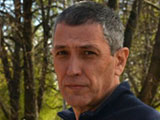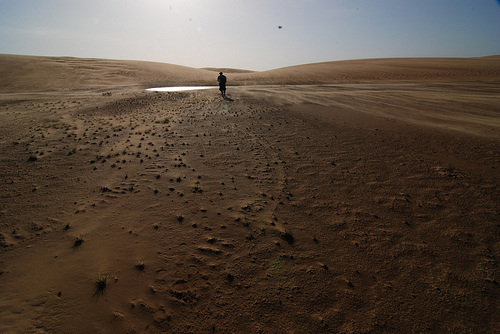The Wasteland
by Israel Centeno / May 22, 2012 / 2 Comments
“All displacement is natural until the ulterior motives of a government make it unnatural.”
One day, you go to the doctor for a routine check-up and you receive the news that you’re no longer healthy and you’re dying. No matter what you do, you are no longer and will never again be healthy. You will never go back to how you were before.

- From his lonely watch post Albert Camus asked who among us has not experienced exile yet still managed to preserve a spark of fire in their soul. “We’re all alone,” Natalia Sedova cried in exile on hearing of her husband Leon Trotsky’s affair with Frida Kahlo. In his novel Night Watch, Stephen Koch follows the incestuous love affair of David and Harriet, wealthy siblings watching the world from their solitary exile. Koch’s writing, Camus’s theories, and Trotsky’s affair all come back to exile and lead me to reflect on the human condition. From my own vantage point, my Night Watch, I will reflect on my questions of exile, writing, and the human condition.

- Israel Centeno was born in 1958 in Caracas, Venezuela, and currently lives in Pittsburgh as a Writer-in-Residence with City of Asylum/Pittsburgh. He writes both novels and short stories, and also works as an editor and professor of literature. He has published nine books in Venezuela and three in Spain.
Another day, you appear on a list. Since you’ve been named, at any moment they can tell you that you’ve lost your job, that you’re not covered by the health care system, “…that perhaps your name’s already on a death list, on a list of future convicts, suspects, traitors.” At any moment they can come and find you. Then you feel completely overwhelmed, history leaves you behind, and you know that you’ve begun a journey to a place where you’ll be subsumed. even though they never knock at your door. Instead they just leave you waiting for fate to take its course.
Displacement and exile are part of man’s conscience. There’s no way of going back into the womb or returning to Eden. We fit ourselves into our lives. We are aware that we have to learn to travel through childhood, which will expel us; through adolescence, which will exclude us; through adulthood, which will come to an end; and through old age, where we will shut ourselves away within ourselves. And we are aware that, ultimately, we will let life go, we will cease to be and, despite having followed the whole route, the dead will pass into memory. One day, friends stop being friends, our time at the university comes to an end, our relatives move away. Relationships are fickle; if someone tells you that they’ll love you forever, forever will come early and they will soon stop loving you.
Whatever happens or stops happening, happy and unhappy events are only vindicated through the exercise of memory. Even then, we are also exiled from our memories. Sometimes people are forced to forget.
When the State, the Party, the Nation, the Church, your town, neighborhood, gang, or club expels you, they make it known that they must strip you of your dignity. The same happens when you travel from childhood to old age, or when you give up on an emotion, or that emotion leaves you. But when an authoritarian power sends you away for reasons of the State, they also conspire to take away your humanity, rid you of your pride, your courage, your name, and all of your worth, in order to leave you in nothingness.
The wasteland of nothingness is where they kill the main character in Kafka’s The Trial. It is in this wasteland that you say the prayer written by Ernest Hemingway: “Our nada, who art in nada, nada be thy name. Thy kingdom nada, thy will be nada, in nada as it is in nada.”
All displacement is natural until the ulterior motives of a government make it unnatural. Any kind of loss puts us out of place. Every gain, too. Certainly, no one will be left unmoved by their life or the lives of others. But we must preserve our memories because there are unacceptable exiles: Those that take away our humanity and force us into the elements drive us to nothingness, that non-place of a wasteland.
Translation: Kelly V. Harrison






2 Comments on "The Wasteland"
Una reflexión que hace reflexionar, sobretodo si se sabe lo que es emigrar. Somos seres en constante emigración… en una carrera de retorno a la fuente, solos en el hacer, y acompañados de muchos que hacen lo mismo…
A thought-provoking reflection, especially if you know what is to emigrate. We are beings in constant migration… in a race back to the source, alone in doing, and accompanied by many who do the same…
Alberto Andrade
Thanks for your marvelous posting! I quite enjoyed
reading it, you happen to be a great author.
I will ensure that I bookmark your blog and may come back someday.
I want to encourage you to continue your great posts, have a nice morning!